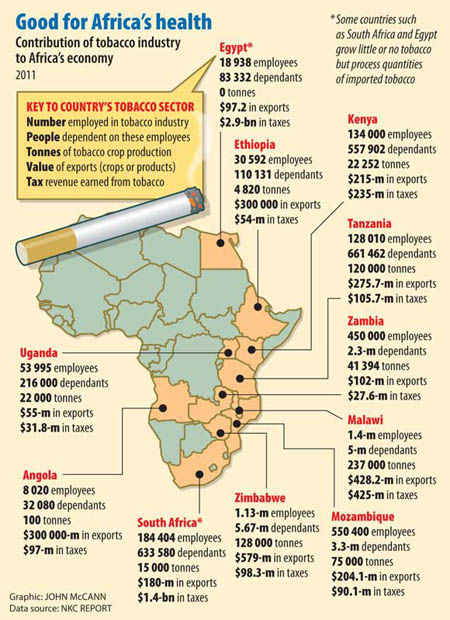Tobacco exports from South Africa were worth $180-million in 2011 and tax revenue from tobacco products bought in the country was $1.4-billion.
New regulations proposed by the World Health Organisation are threatening the income of millions of Africans who rely on tobacco farming to support them and their families.
This is according to a report compiled by NKC Independent Economists, which assesses the importance of the tobacco farming markets in 15 African countries.
In South Africa, nearly 185000 people are employed in the tobacco industry and there is a wider dependency of about 634000 people.
Tobacco exports from South Africa were worth $180-million in 2011 and tax revenue from tobacco products bought in the country was $1.4-billion.
The report, commissioned by the Tobacco Institute of Southern Africa, is a response to proposals by the WHO to curb the growing of tobacco leaf.

Graphic: John McCann
The proposals, known as articles 17 and 18 of the organisation's framework convention on tobacco control, will be discussed at the Conference of the Parties 5 meeting in Seoul, Korea, in November.
The institute's chairperson and chief executive, Francois van der Merwe, said the organisation was trying to pass regulations without consulting the industry. "Health bureaucrats in smart suits and pointed shoes in air-conditioned offices in Geneva are making decisions."
Extremist
Van der Merwe said that the South African government would not listen to the tobacco market and called the country's health officials "extremist".
Health Minister Aaron Motsoaledi was this week reported as saying that the economic benefits were a lot less attractive when measured against the heath costs, which are a massive strain on state funds.
According to the WHO, tobacco use kills more than five million people a year.
"There is a fundamental and irreconcilable conflict between the interests of the tobacco industry and public health," it said.
"The industry produces and promotes a product that has been proven scientifically to be addictive, cause disease and death and give rise to a variety of social ills, including increased poverty.
Decreasing smoking
"Therefore, parties should protect the formulation and implementation of public health policies for tobacco control from the tobacco industry to the greatest extent possible."
The NKC report says that in the 15 countries – Angola, Botswana, Egypt, Ethiopia, Kenya, Lesotho, Malawi, Mozambique, Namibia, South Africa, Swaziland, Tanzania, Uganda, Zambia and Zimbabwe – 4.4-million Africans are employed and there is a total dependency of 24-million people. The tobacco markets in these countries total $10-billion, according to the report.
The WHO aims to reduce tobacco farming as a way of decreasing smoking and will offer farmers incentives to shift to alternative crops.
Africa only makes up 7.6% of tobacco farming, whereas Asian countries produce 64.3% and countries in North, South and Central America and the Caribbean 23%.
In 2010 there were 1.1-billion smokers in the world. By 2025, the WHO predicts, there will be 1.6-billion.
According to the report, Egypt ($2.9-billion collected in tax) and South Africa ($1.4-billion in tax) have the largest local tobacco markets, but both produce only a small tonnage of crop and the income derives from processing the tobacco.
The WHO said that "the farmers themselves earn very little for their crop in comparison with the final price obtained at the end of the value-added chain".